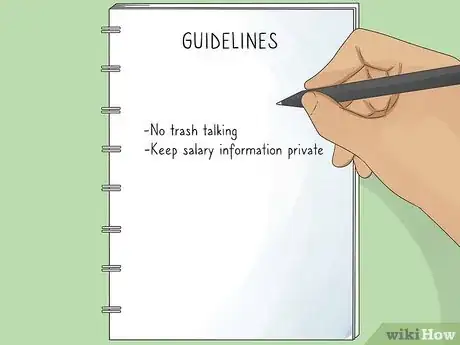This article was co-authored by Kim Chronister, PsyD. Dr. Kim Chronister is a Licensed Clinical Psychologist. She specializes in helping people struggling with substance abuse, relationship problems, eating disorders, and personality disorders. Dr. Chronister has contributed to and appeared on Access Hollywood, Investigation Discovery, and NBC News. She is the author of “Peak Mindset” and “FitMentality.” She holds an MA in Clinical Psychology and a Doctor of Psychology (PsyD) from Alliant International University.
There are 18 references cited in this article, which can be found at the bottom of the page.
This article has been viewed 44,024 times.
Competition is a part of many situations in life, and can even be a motivating force. Unhealthy levels of competition, however, can make you feel pressured, jealous, anxious, and deeply frustrated. By creating and following guidelines for getting along well with others, and by practicing good habits of thought, however, you can work more efficiently and feel better about yourself.[1]
Steps
Dealing with Others
-
1Act gracefully. You can’t guarantee that you will always succeed, but you can take charge of how you feel. Whether you are at work, at school, playing sports, or in any other kind of competitive environment, focus on showing good character. Be proud of others’ efforts and your own, no matter who comes out on top. For instance:
- Be a good sport.[2] After playing a game, take a moment to congratulate other players and celebrate having a good time. Do this whether you win or lose. Remember that competition is healthy.[3]
- Play fair. You won’t feel completely good about succeeding at something if you don’t play by the rules.
- Avoid trash talking others in sports, school, work, etc.
- Don’t be a sore loser. If you don’t win a game, or get that big promotion at work, or get the highest grade, you don’t have to complain about it. Focus on improving and achieving your goals in the future.
-
2Practice empathy.[4] When you feel the pressure of competition, take a moment to consider how others feel as well. They may be in the same situation as you. By getting in the habit of thinking outside of your own goals and concerns, you will develop a healthier attitude toward competition.
- To practice seeing the world from the perspectives of other people, ask yourself simple questions like “I know why I want to land this promotion—why might John Doe want it?”
Advertisement -
3Use your sense of humor. Oftentimes the pressure of competition can be diffused with a joke. Laugh a little at yourself when you make a mistake, and focus on improving at your own pace.
- For instance, if you are playing a game of basketball and you miss your tenth three pointer in a row, say something to poke a little fun at yourself, like “Wow, that ball just doesn’t feel like going in the net today.” Just move on, and then you can practice some during your free time if you want.
-
4Avoid and recognize covert competition. Sometimes, competition isn’t as explicit as the struggle to win a game or award. Instead, people can express competitive attitudes more subtly through the things they say. This covert, indirectly aggressive type of competition can be just as stressful and is usually unnecessary.[5] You can recognize and avoid instances of covert competition.
- If your coworker gets a promotion that you really wanted, avoid indirectly aggressive statements like “Oh, I thought they wanted someone with more experience.” Instead, say something positive, like “Well, that sounds like a great opportunity for you.”
- If you get a promotion and a coworker says something covertly competitive to you, respond with something like “I’ve been working really hard to get the skills and experience for this new position.”
-
5Deal with others who play dirty. Dealing with cheaters and rule-breakers can be very frustrating when you are trying to do things fairly. This is especially so when the stakes are high, such as when you are trying to win a title or award. There are some things you can do individually as part of a group to reduce cheating and deception, however.[6] [7] [8] [9]
- Amplify the message that cheating is going on. You don't have to "tell on" someone individually, but if you notice something wrong going on, suggest that everyone go over the rules again.
- Even if you have definitive evidence that rules have been broken, it may not be your job to call someone out. If you normally report to a supervisor, coach, or other authority figure, let him/her know about the problem and decide what to do about it.
- Create a "no cheating" pact with your teammates, coworkers, etc. Studies show that pledging an honor code reduces the prevalence of cheating.
- Be a good role model. Don't cheat, and don't condone cheating. You may not be able to stop all the cheating at all times, but you will feel good about living up to standards you believe in.
-
6Keep some information private to reduce competition.[10] [11] In situations where personal competition is high, such as in schools or at work, it is important to remember that not all information needs to be shared. Keeping some information private can reduce feelings of jealousy and anxiety, and thereby unhealthy levels of competition. For instance,
- Schools that publicly report test scores, such as on bulletin boards, don’t have to use student names when doing so. Instead, each student can be given a code, and scores can be printed next to each code. That way, each student will know his or her score, but not the scores of other students.
- In the workplace, managers should decide on what types of information to keep private to reduce competition, including salaries, information from reviews and evaluations, etc.
-
7Create the right kind of environment. Those involved in a competitive field or situation often have the power to choose the atmosphere they want. If people work collaboratively instead of competing at all costs, there can be room for both healthy competition and growth for all.[12] For instance:
- You can draft a set of guidelines for competition in your school, workplace, etc. that everyone can agree on, like “No trash talking,” “Keep salary information private,” etc.
- If you are training in a sport that pits one person against another, such as track and field, work with your coaches and fellow athletes to develop collaborative, peer training exercises where those with strengths in a certain area help others improve.
Finding the Right Attitude
-
1Determine the cause of competition.[13] If you are feeling the pressure of competition, it will help to determine the root of those feelings. You might already know what you want to achieve, such as winning a sporting event or becoming valedictorian. Even so, ask yourself why you want to achieve this goal. Possible reasons for wanting to compete include things like:[14]
- Material value (getting a promotion means a raise at work)
- Praise (teachers or parents will be happy for you if you get the highest score on an exam)
- Prestige (becoming valedictorian increases your chances of getting into a top college)
- Honor (winning more games means your team can get a sports title)
- A little competition can be motivating, but if you're constantly struggling for validation, attention, acceptance, or belonging, then stress over a long period of time can have long-term health effects on your body.[15]
-
2Acknowledge your frustrations and disappointments.[16] If you want to deal with competition and the feelings it causes, it helps to determine exactly what kinds of stress you feel. You might face pressure from others, or just be hard on yourself. When you are feeling the burden of competition, stop and try to articulate your feelings with specific statements like:
- “I’m disappointed that I didn’t when the game”
- “I’m frustrated that others keep getting promoted over me at work”
- “I feel like I study all the time and still don’t get the highest grades.”
-
3Set your own goals. When all of your friends are running for valedictorian, you can’t all get there.[17] To deal with competition in a healthy way, it is important to set goals that work for you, and to stick to them no matter what happens to other people. For instance, you can set a personal goal of graduating with a 3.8 or higher grade point average. If that means you become valedictorian, then great. But if you meet your goal, no matter who becomes valedictorian, you will feel successful.
- Reframe the word "competition" to mean that every morning, you want to be better than you were yesterday. This growth mindset focuses on building your skills, not on getting your validation from the binary of success/failure.[18]
-
4Expect to “win some, lose some.” No matter how hard you work or practice, you can’t expect to always win every game, get the highest grade, excel at work, etc. Most of the successful athletes have experienced more losses than wins.[19] Dealing with competition means developing a healthy attitude toward both winning and losing.[20] Be proud when you are successful, and don’t beat yourself up if you don’t always wind up on top. When you’re down, focus on past successes and a positive desire to improve in the future.
- There are ways to develop your tolerance for both winning and losing. For instance, try playing some more games that are low-stakes or cooperative, like non-competitive team sports or cooperative board games.[21]
-
5Focus on personal growth.[22] Keeping your long-term growth and overall sense of character in mind is an important part of dealing with competition. Instead of saying you can’t do something when you’re not instantly successful at it, put it into perspective.[23]
- For instance, if you’re a great basketball player and decide to try out soccer, don’t be too hard on yourself if you don’t win at first. Remember that your long-term goal is to diversify the sports you play and become a better athlete overall.
- Remember, it can always be satisfying to learn your strengths, then build on those strengths so you continue to be challenged.[24]
-
6Beat competition anxiety. If the very idea of having to compete causes you stress, you may be experiencing competition anxiety. This often occurs before major competitive events, like games and examinations. If you start to worry about your performance or ability to succeed before such an event, you can deter anxiety by:[25]
- Playing music that makes you feel energized and fired up.
- Trying breathing exercises, such as breathing in through the nose and exhaling slowly through the mouth.
- Avoiding negative or self-defeating thoughts, like “I’ll never be as good as John Doe.”
- Encouraging yourself with positive thinking, like “I’m getting a little better at this every day.”
-
7Control stressors. If you are experiencing stress in some non-competitive aspect of your life, it can still interfere with your ability to perform in a game, at work, at school, etc. These stressors may not always be in your control, such as when you or someone in your family is sick. You can manage stress and minimize its effect on competition by:[26]
- Trying breathing exercises]
- Contracting and relaxing your muscles
- Trying visualization techniques
- Practicing mindfulness meditation techniques
- Utilizing positive self-talk, like “I can do this, no matter what!”[27] [28]
-
8Learn the benefits of healthy competition.[29] If you are having trouble handling any competition at all, it can be helpful to remind yourself of how it can be beneficial. When competition is executed and handled properly, it can help you do things like:
- Set goals
- Learn limitations
- Handle loss
- Develop problem-solving skills
- Learn cooperation
-
9Recognize unhealthy competition.[30] On the other hand, when the stress of competition is too great, it has a detrimental effect. When you are involved in too many competitive activities, attempt to be the best at everything, or are pressured too much by external factors (coaches, parents, etc.), you might encounter negative feelings, like:
- Humiliation
- Stress
- Frustration
- Anger
- Jealousy
Expert Q&A
-
QuestionHow can you deal with competition and not become too competitive and/or stressed out, especially at work?
 Tara BradfordTara Bradford is a Brand Strategist, Life and Mindset Coach, and the Founder of The Bradford Institute, a life and leadership coaching company in New York City. She is also a guest lecturer at Fordham's Gabelli School of Business in the MS Media Management program. With over five years of experience, Tara specializes in personal branding, executive presence, and thought leadership. Tara brings her background in Neuroscience, Psychology, Biochemistry, and Social and Behavioral Sciences into her coaching practice. She received a BS in Nursing from the University of Arizona and studied Biochemistry at the University of New England. She is certified in high-performance coaching, neurolinguistics, hypnotherapy, success coaching, and emotional freedom and TIME techniques. Her podcast titled Handle Everything is dedicated to sharing this message.
Tara BradfordTara Bradford is a Brand Strategist, Life and Mindset Coach, and the Founder of The Bradford Institute, a life and leadership coaching company in New York City. She is also a guest lecturer at Fordham's Gabelli School of Business in the MS Media Management program. With over five years of experience, Tara specializes in personal branding, executive presence, and thought leadership. Tara brings her background in Neuroscience, Psychology, Biochemistry, and Social and Behavioral Sciences into her coaching practice. She received a BS in Nursing from the University of Arizona and studied Biochemistry at the University of New England. She is certified in high-performance coaching, neurolinguistics, hypnotherapy, success coaching, and emotional freedom and TIME techniques. Her podcast titled Handle Everything is dedicated to sharing this message.
Life & Mindset Coach Competition brings to mind sports, where there's a winner or a loser. This can be motivating, but it can also be polarizing if you're constantly striving for validation and belonging. Instead of unhealthily being in competition mode all the time, reframe "competition" to mean, every morning I wake up and want to be better than I was yesterday. Then your focus is on building your skills over time, not on getting to the top in order to make all your work valid and valuable.
Competition brings to mind sports, where there's a winner or a loser. This can be motivating, but it can also be polarizing if you're constantly striving for validation and belonging. Instead of unhealthily being in competition mode all the time, reframe "competition" to mean, every morning I wake up and want to be better than I was yesterday. Then your focus is on building your skills over time, not on getting to the top in order to make all your work valid and valuable.
References
- ↑ Tara Bradford. Life & Mindset Coach. Expert Interview. 16 September 2020.
- ↑ http://kidshealth.org/teen/food_fitness/sports/sportsmanship.html
- ↑ Jessica George, MA, CHt. Certified Professional Master Life Coach. Expert Interview. 11 February, 2022.
- ↑ http://www.davidsongifted.org/db/Articles_id_10744.aspx
- ↑ http://www.amanet.org/training/articles/Caution-Women-Competing-at-Work.aspx
- ↑ http://www.businessinsider.com/your-field-guide-to-the-rat-bastards-of-office-politics-2010-10
- ↑ http://www.cs.duke.edu/csed/tatrain/2014uta/TAAdvice.pdf
- ↑ https://www.healthychildren.org/English/family-life/family-dynamics/communication-discipline/Pages/Competition-and-Cheating.aspx
- ↑ http://www.ethicalsystems.org/content/cheating-honesty
- ↑ http://blogs.wsj.com/atwork/2015/04/14/when-workplace-competitions-backfire/?utm_campaign=Socialflow&utm_source=Socialflow&utm_medium=Twee
- ↑ http://papers.ssrn.com/sol3/papers.cfm?abstract_id=2594258
- ↑ http://web.calstatela.edu/faculty/jshindl/cm/Chapter18competition-final.htm
- ↑ Jessica George, MA, CHt. Certified Professional Master Life Coach. Expert Interview. 11 February, 2022.
- ↑ http://web.calstatela.edu/faculty/jshindl/cm/Chapter18competition-final.htm
- ↑ Tara Bradford. Life & Mindset Coach. Expert Interview. 16 September 2020.
- ↑ http://www.davidsongifted.org/db/Articles_id_10744.aspx
- ↑ http://www.pamf.org/teen/life/stress/academicpressure.html
- ↑ Tara Bradford. Life & Mindset Coach. Expert Interview. 16 September 2020.
- ↑ Kim Chronister, PsyD. Clinical Psychologist. Expert Interview. 28 July 2021.
- ↑ Jessica George, MA, CHt. Certified Professional Master Life Coach. Expert Interview. 11 February, 2022.
- ↑ http://www.davidsongifted.org/db/Articles_id_10744.aspx
- ↑ Jessica George, MA, CHt. Certified Professional Master Life Coach. Expert Interview. 11 February, 2022.
- ↑ http://www.davidsongifted.org/db/Articles_id_10744.aspx
- ↑ Tara Bradford. Life & Mindset Coach. Expert Interview. 16 September 2020.
- ↑ http://www.ncsasports.org/blog/2015/08/08/athletes-deal-competition-anxiety/
- ↑ http://kidshealth.org/parent/positive/family/sports_competition.html
- ↑ http://kidshealth.org/teen/food_fitness/sports/sports_pressure.html#
- ↑ http://www.appliedsportpsych.org/resource-center/resources-for-athletes/dealing-with-anger-in-competition/
- ↑ Jessica George, MA, CHt. Certified Professional Master Life Coach. Expert Interview. 11 February, 2022.
- ↑ Jessica George, MA, CHt. Certified Professional Master Life Coach. Expert Interview. 11 February, 2022.














































































